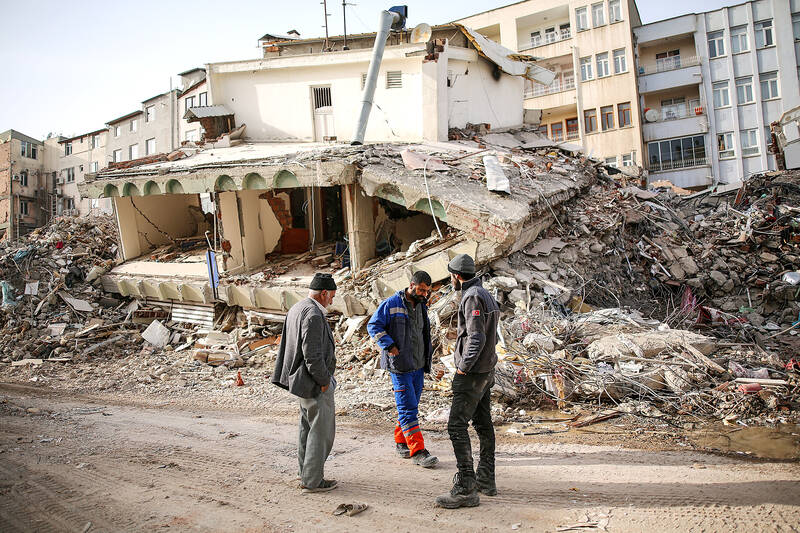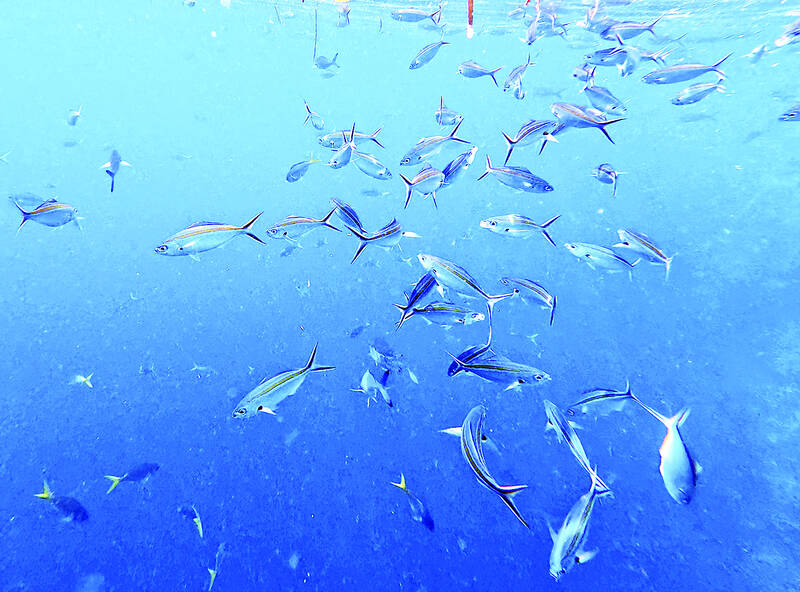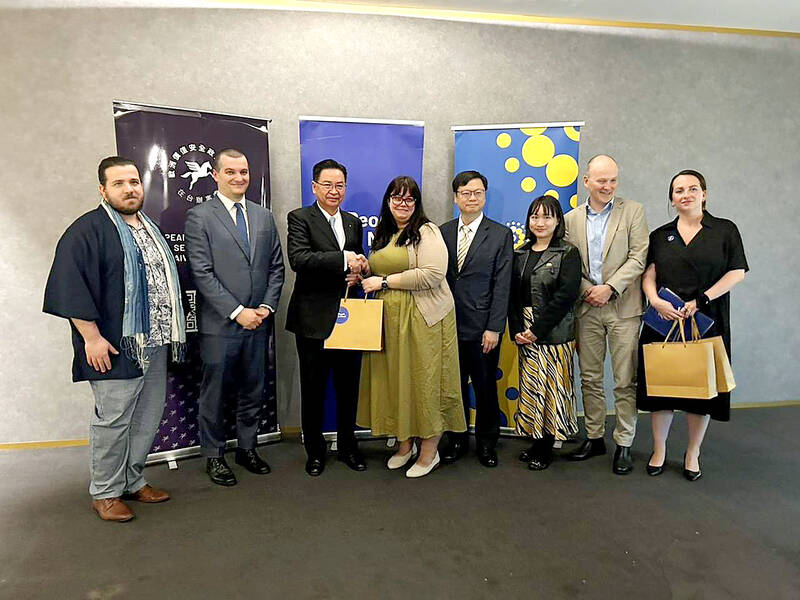That US assistance was a model for Taiwan’s spectacular development success was early recognized by policymakers and analysts.
In a report to the US Congress for the fiscal year 1962, former President John F. Kennedy noted Taiwan’s “rapid economic growth,” was “producing a substantial net gain in living.”
Kennedy had a stake in Taiwan’s achievements and the US’ official development assistance (ODA) in general: In September 1961, his entreaty to make the 1960s a “decade of development,” and an accompanying proposal for dedicated legislation to this end, had been formalized by congressional passage of the Foreign Assistance Act.

Photo: EPA-EFE
Two months later, Kennedy established the United States Agency for International Development (USAID) by executive order to coordinate ODA initiatives. The agency assumed the functions of predecessors such as the International Cooperation Administration (ICA), which — as noted in part one of this article on March 19 — had been active in Taiwan since the early 1950s.
While the intention was to create a body with administrative autonomy from the State Department, the dual origins of the act and the agency tasked with facilitating it portended the current crisis over whether ultimate purview lies with the legislative or executive branch.
With US President Donald Trump’s administration pushing a unitary executive interpretation of government, challenges to its bid to shut down USAID currently occupy the judiciary.

Photo: AP
BROADER SIGNIFICANCE
The threat extends further than is apparent superficially, says Mina Chiang (江玉敏), founder and director of Human Research Consultancy (HRC). A UK-based social enterprise that combats human trafficking and modern slavery, HRC has tackled rights abuses in Taiwan’s fishing industry and cooperated with USAID-funded nongovernmental organizations (NGOs). Chiang cites extant and slated HRC projects involving cooperation with agencies across various fields of expertise that are now jeopardized.
Planned cooperation with UN bodies has also been scuppered, due to the withdrawal of USAID support.

Photo: James Baron
“We were in the very final stage with a bidding process with one UN agency, but we have been informed that it’s on hold, because of the disruption,” Chiang says.
For the International Cooperation and Development Fund (TaiwanICDF), Taiwan’s dedicated ODA agency, the short-term damage looks less disastrous. Speaking in February at an event highlighting cooperation with the Czech-based People in Need (PIN) — one of Central Europe’s largest humanitarian NGOs — TaiwanICDF Deputy Secretary General Peifen Hsieh (謝佩芬) noted that projects with USAID were generally coordinated in stages.
For two ongoing projects on digital healthcare in Fiji and strengthening micro, small, and medium sized enterprises (MSMEs) in Paraguay, the USAID-backed contribution has been completed, Hsieh says.
“For the health projects in Fiji, USAID provided the hardware, and we provided the software, so they have done their part, and that project will be concluded in May,” she says.
In an e-mailed response, TaiwanICDF public relations specialist Elisa Chiang (張郁琪) confirmed that USAID had provided servers and tablets “in mid-2023” and noted that a USAID representative in Fiji had continued to support the project through participation in meetings, technical guidance and promotional efforts.
“As a result, the project has not been affected by the current situation at USAID,” Chiang wrote.
The Paraguay project, said Hsieh, was in “a similar situation,” though the status of cooperation on climate-related disaster resilience under USAID’s Pacific American Fund remained unclear.
Much has been made in international media of opportunities for Beijing that Trump’s ODA backsliding may offer. But aside from providing “proof” of the US’ unreliability as a partner — a common theme in Chinese propaganda — there are wider security implications.
One example is evident in collaboration between the TaiwanICDF and USAID on strengthening the monitoring of illegal, unreported and unregulated fishing (IUU) in Palau. Ostensibly about safeguarding Palau’s exclusive economic zone (EEZ), the project serves other purposes.
“A lot of illegal Chinese vessels operate in that area,” says an ODA professional (quoted under condition of anonymity in part one). “We exchange information about that.”
The broader risks are also picked on by Chiang, who says human trafficking networks are a multifaceted threat.
“America has lost billions to transnational organized criminal groups,” she says. “Stopping funding sends a clear signal for them to expand — and we know they are expanding from satellite images around the borders [in Southeast Asia], where they are building compounds.”
Yet, the structural weaknesses that have undermined USAID may point the way to alternative ODA models complementing Taiwan’s experience. Although USAID started as a hands-on partner to developing countries, it transitioned to a delegatory role, funding, designing, and managing projects implemented by local NGOs.
In contrast, Taiwan has maintained direct assistance through technical and medical missions comprising homegrown experts.
“Rather than delegate, Taiwan dispatches missions to implement projects on the ground,” says the ODA professional.
He believes cooperation between local ODA agencies and Taiwan’s representative offices abroad is another advantage for Taiwan.
“US embassies don’t have much power to control projects,” he says. “That could be one reason Trump took such drastic measures — without state involvement, he does not think [these projects] represent US diplomatic interests.”
TRADE OFFICES
Coordination of ODA through Taiwan’s de facto embassies is backed by other analysts.
“I believe an alternative ODA through Taiwan [trade offices] can be a solution,” says Chien Shiuh-shen (簡旭伸), a professor in geography, development and urban studies at National Taiwan University and an advisor to the Taiwan Alliance in International Development (TaiwanAID) — an umbrella group for Taiwanese NGOs.
He highlights direct assistance on disaster relief from the Taipei Economic and Cultural Mission in Ankara after the devastating earthquake that struck Turkey in February 2023. During the same period, the TaiwanICDF and PIN also cooperated on helping nano and micro-enterprises in Turkish communities recover their losses. These efforts followed the signing of a partnership agreement between Taiwan’s Ankara office and the Turkish Red Crescent to provide humanitarian relief to Afghanistan after the 2022 earthquake there.
While Taiwan’s ODA community prepares for the worst, it is hoping for the best. “I think Taiwan and US are still like-minded countries” said Hsieh at the February event. “Taiwan’s ODA work was greatly inspired by the US, financially and spiritually, so we definitely hope to continue working, not just with USAID, but with other US agencies.”

Google unveiled an artificial intelligence tool Wednesday that its scientists said would help unravel the mysteries of the human genome — and could one day lead to new treatments for diseases. The deep learning model AlphaGenome was hailed by outside researchers as a “breakthrough” that would let scientists study and even simulate the roots of difficult-to-treat genetic diseases. While the first complete map of the human genome in 2003 “gave us the book of life, reading it remained a challenge,” Pushmeet Kohli, vice president of research at Google DeepMind, told journalists. “We have the text,” he said, which is a sequence of

On a harsh winter afternoon last month, 2,000 protesters marched and chanted slogans such as “CCP out” and “Korea for Koreans” in Seoul’s popular Gangnam District. Participants — mostly students — wore caps printed with the Chinese characters for “exterminate communism” (滅共) and held banners reading “Heaven will destroy the Chinese Communist Party” (天滅中共). During the march, Park Jun-young, the leader of the protest organizer “Free University,” a conservative youth movement, who was on a hunger strike, collapsed after delivering a speech in sub-zero temperatures and was later hospitalized. Several protesters shaved their heads at the end of the demonstration. A

Every now and then, even hardcore hikers like to sleep in, leave the heavy gear at home and just enjoy a relaxed half-day stroll in the mountains: no cold, no steep uphills, no pressure to walk a certain distance in a day. In the winter, the mild climate and lower elevations of the forests in Taiwan’s far south offer a number of easy escapes like this. A prime example is the river above Mudan Reservoir (牡丹水庫): with shallow water, gentle current, abundant wildlife and a complete lack of tourists, this walk is accessible to nearly everyone but still feels quite remote.

In August of 1949 American journalist Darrell Berrigan toured occupied Formosa and on Aug. 13 published “Should We Grab Formosa?” in the Saturday Evening Post. Berrigan, cataloguing the numerous horrors of corruption and looting the occupying Republic of China (ROC) was inflicting on the locals, advocated outright annexation of Taiwan by the US. He contended the islanders would welcome that. Berrigan also observed that the islanders were planning another revolt, and wrote of their “island nationalism.” The US position on Taiwan was well known there, and islanders, he said, had told him of US official statements that Taiwan had not